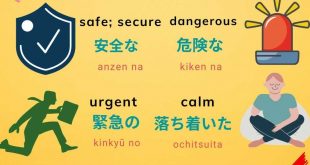1000 Most Common Japanese Words – Part 3
201. 閉じる (tojiru) : shut, close (books, eyes, etc.)
202. 時 (toki) : time, moment
203. 米 (kome) : rice (grain)
204. 切る (kiru) : cut
205. 楽しい (tanoshii) : fun, enjoyable
206. 服 (fuku) : clothes (colloquial)
207. 後ろ (ushiro) : back, behind
208. 嬉しい (ureshii) : happy, glad
209. 腰 (koshi) : waist, lower back
210. 日曜日 (nichiyoubi) : Sunday
211. 昼 (hiru) : daytime, midday
212. お母さん (okaasan) : mother (colloquial)
213. 大学生 (daigakusei) : university student
214. 終わり (owari) : end, conclusion
215. 背 (se) : height, stature
216. 手伝う (tetsudau) : help, assist
217. 鼻 (hana) : nose
218. 起きる (okiru) : occur, happen, wake up, get up
219. 載せる (noseru) : place, put on
220. 悲しい (kanashii) : sad
221. しゃべる (shaberu) : chat, talk
222. 近く (chikaku) : in the near future, before long
223. 甘い (amai) : sweet
224. テーブル (te-buru) : table
225. 食べ物 (tabemono) : food (colloquial)
226. 始まる (hajimaru) : begin
227. ゲーム (ge-mu) : game
228. 十 (juu) : ten
229. 天気 (tenki) : weather
230. 暑い (atsui) : hot (of weather)
231. 太い (futoi) : thick, fat
232. 晩 (ban) : evening, night (from sunset to bedtime)
233. 土曜日 (doyoubi) : Saturday
234. 痛い (itai) : sore, painful
235. お父さん (otousan) : father, dad (colloquial)
236. 多分 (tabun) : probably, perhaps
237. 時計 (tokei) : clock, watch
238. 泊まる (tomaru) : stay overnight
239. どうして (doushite) : how come
240. 掛ける (kakeru) : hang, put on
241. 曲がる (magaru) : make a turn, turn
242. お腹 (onaka) : stomach, belly
243. ミーティング (mi-tingu) : meeting
244. 嫌い (kirai) : dislike (habitual)
245. 金曜日 (kinyoubi) : Friday
246. 要る (iru) : need, require
247. 無い (nai) : to not be
248. 風邪 (kaze) : cold (illness)
249. 黄色い (kiiroi) : yellow
250. 優しい (yasashii) : gentle, kind
251. 晴れる (hareru) : be sunny, clear up
252. 汚い (kitanai) : dirty
253. 茶色 (chairo) : brown
254. 空く (suku) : be empty, become less crowded
255. 上る (noboru) : go up, climb
256. ご飯 (gohan) : meal, cooked rice
257. 日 (nichi) : counter for days
258. 髪の毛 (kaminoke) : hair, each single hair
259. つける (tsukeru) : switch on, turn on
260. 月曜日 (getsuyoubi) : Monday
261. 入る (hairu) : enter
262. カタカナ (katakana) : katakana
263. 今週 (konshuu) : this week
264. 開く (hiraku) : open (books, eyes, etc.)
265. 水 (mizu) : water
266. あれ (are) : that (over there)
267. 二 (ni) : two
268. 締める (shimeru) : tighten, fasten
269. まずい (mazui) : bad (taste), distasteful
270. 平仮名 (hiragana) : hiragana
271. 曇る (kumoru) : become cloudy
272. 触る (sawaru) : touch, feel
273. 駄目 (dame) : no good
274. 飲み物 (nomimono) : beverage, drink
275. 木曜日 (mokuyoubi) : Thursday
276. 曜日 (youbi) : day of the week
277. そば (soba) : side, vicinity
278. こっち (kocchi) : here, this way (casual)
279. 火曜日 (kayoubi) : Tuesday
280. 渇く (kawaku) : be thirsty
281. 三 (san) : three
282. 水曜日 (suiyoubi) : Wednesday
283. 二つ (futatsu) : two (things)
284. 今晩 (konban) : this evening, tonight
285. 千 (sen) : thousand
286. 六日 (muika) : six days, sixth of the month
287. お姉さん (onesan) : older sister
288. 直る (naoru) : be repaired, get fixed
289. ちょっと (chotto) : just a moment, just a little
290. 四 (yon) : four (Japanese origin)
291. これから (korekara) : from now on, after this
292. 考える (kangaeru) : think, consider
293. 戻る (modoru) : return to a point of departure
294. 変える (kaeru) : change (something), alter
295. 朝 (asa) : morning
296. 歯 (ha) : tooth
297. 頑張る (ganbaru) : work hard, do one’s best
298. 携帯電話 (keitaidenwa) : cellular phone
299. 雨 (ame) : rain
300. 金 (kane) : money (colloquial)
 Nihongo Nihongo
Nihongo Nihongo







